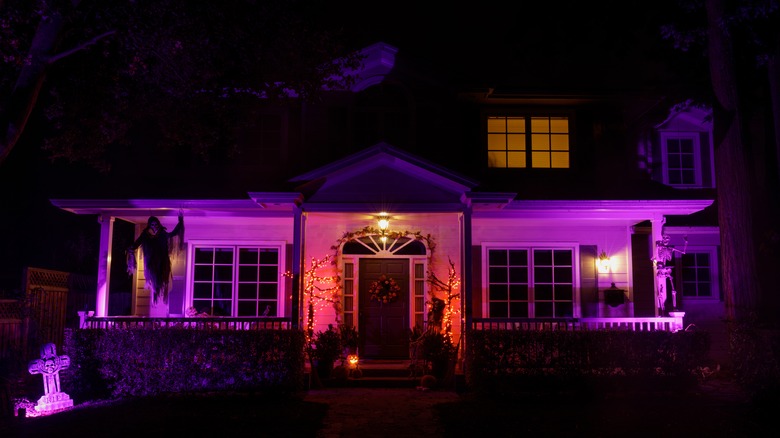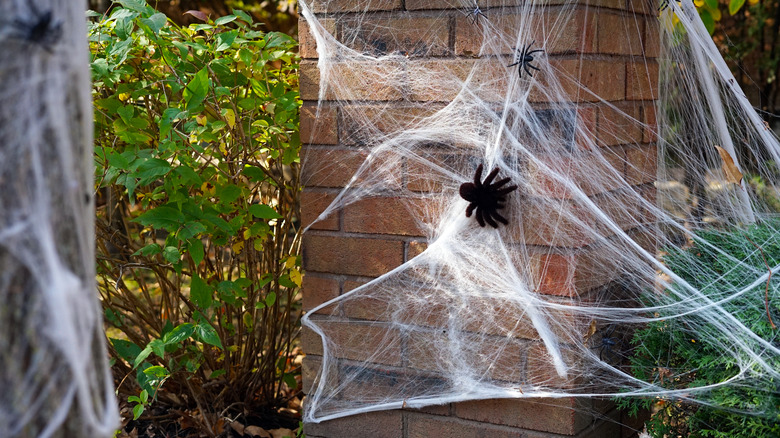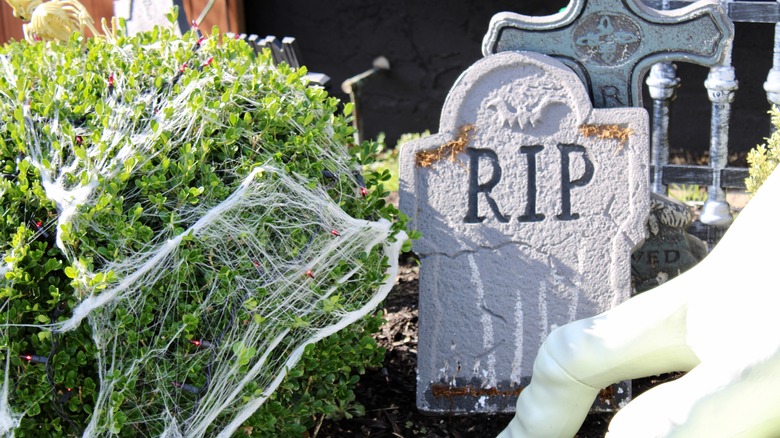Why Your Halloween Yard Decorations May Actually Be Dangerous To Wildlife
While many people want their homes to look like the stuff of nightmares when it comes time to get into the Halloween spirit, some of the décor that spooky season enthusiasts use to deck out their yards can actually be a real nightmare for wildlife. While there are certain types of Halloween decorations that are noted to be particularly dangerous to wildlife and the environment, Cathy Stockman, director of operations at Shades of Hope Wildlife Refuge, says via HuffPost that it's important to be careful when using all types of holiday décor and to ensure you are responsibly celebrating the season.
Anything that an animal could potentially chew or become entangled in poses a real threat, but the fake spider webs that are often found incorporated into outdoor Halloween displays this time of year can be a real danger to insects and animals. Choosing the right kind of Halloween decorations and displaying them in a way that doesn't pose a threat to the neighborhood wildlife can make your spooky décor a lot less spooky for the innocent critters passing through your yard.
Avoid fake spider webs
Decking your property with fake spider webs this Halloween might seem like a cool and easy way to leave your pad looking creepy, but experts say these fake webs can not only be creepy but incredibly dangerous to wildlife. Fake webs used in a Halloween yard display can be just as sticky and hard for insects and animals to break free from as real spider webs. While insects are obviously small enough to become entangled in the faux webs, there have been numerous reports of birds and other small animals getting caught as well. WildCare even rescued a screech owl entangled in fake spider web material several years ago.
Kathryn Dudeck, wildlife director of the Chattahoochee Nature Center in Georgia, said via Treehugger that Halloween is the time of the year when wildlife rehabilitation centers receive the most calls regarding birds, chipmunks, and other small animals being caught in these types of decorations. "We get birds in every single year during migration that have flown in and gotten entangled in weird stuff," added Chantal Theijn, wildlife rehabilitator at Hobbitstee Wildlife Refuge in Ontario via Treehugger. "It's hard for them to see something as fine as that spider web."
Plastic is scary
In addition to netted materials and webs, the plastic that most Halloween décor and costumes are made of can pose a real threat to the environment and wildlife. According to The Guardian, a 2019 study estimated that 2,000 tons of plastic waste from Halloween decorations and costumes was generated by the U.K. alone during that year. That amount of plastic waste is equivalent to 83 million plastic bottles.
The same study found that out of the 19 polled British retailers' outfits available in the stores and 324 sample materials taken, 83% of the fabrics were made of non-biodegradable textiles that would likely end up polluting landfills or oceans, posing a major threat to the environment and to marine life.
While this shouldn't deter you from getting into the holiday spirit altogether, it should certainly encourage you to decorate and dress up in a more environmentally responsible way. HuffPost suggests exclusively using Halloween décor labeled as "PVC-free" or "phthalate-free." According to Greenpeace, PVC is the type of plastic that is by far the most toxic to the environment.


